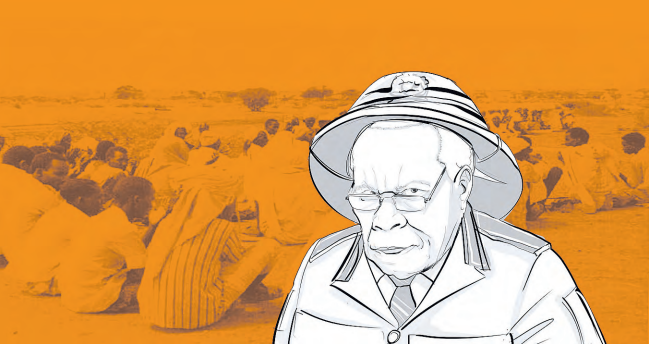
When he landed in Garissa in April 1980 donning a wide-brimmed hat of a freshly minted Provincial Commissioner, Benson Naaman Kaaria was breathing fire.
He wasted little time in announcing to the locals that if they felt fed up with Kenya as a country, they should simply pack their bags and go back to Somalia.
Go back? Yes, you read that right! To the locals who had been choking under the combined weight of shifta war, banditry and government brutality, his arrival added swell to their suffering.
For the next four years, Kaaria would unleash raw terror on the locals. Banditry or shifta attacks would be met with the full wrath of the government through repressive colonial tactics, such as communal punishment.
Two terrible incidents stood out from his reign and carved his place in ignominy. In scope, target, scale and scheme, they would easily qualify as crimes against humanity in this age.
In the first incident, a shifta attack on a nightclub in Garissa town left four civil servants dead. In turn, all the locals were rounded up and herded like goats into an enclosure, and interrogated for days.
Your guess is as good as mine as to how polite the interrogation was, complete with the benefit of Miranda rights.
There were reports of widespread rape of local women as security men descended on their manyattas, and took away their men.
To rub it in, they torched the manyattas as they left, rendering the women and children who were left behind homeless.
The second incident was the Wagalla massacre of 1984, also sanctioned by Kaaria. A bandit attack on Ajuran clan members led to the rounding up of all Degodia clan men, and torture at the Wagalla Airstrip.
For four days, the men were held captive under the scorching sun. They were beaten, starved and tortured.
During a visit to Wagalla more than 15 years ago, I met men who still bear the scars of having their weak frames pressed against the runway murram by heavy boots.
Tears flowed freely as they revisited the horror they went through. Just like Garissa before, their manyattas were torched, and their women raped.
In one striking case, a disabled person was burned inside the manyatta. At the airstrip, when they could not take the torture any more, they attempted to break out. They were mercilessly mowed down and their bodies dumped – yes, dumped – in the wilderness.
It is said that as many as 2,500 people may have died in that carnage. When he visited the massacre site, Kaaria never bothered to see the bodies of the dead or to visit the injured who were being treated in hospitals in Wajir town. Instead, he recommended tougher treatment for the grieving community.
When the news reached Nairobi, Kaaria was swiftly kicked out of the province, demoted to work for a government corporation, and eventually faded away from public service.
Fast forward to 2011, and Kaaria is given a platform to make amends at the Truth, Justice and Reconciliation Commission. In the full glare of the weeping widows of Wagalla, he refused to budge, saying he had nothing to apologise for, expressing satisfaction with the operation.
Instead, he demanded their sympathy, saying he worked for the people of North Eastern, and they should be grateful to him.
He also told the commission that he was enjoying his retirement. Men like Kaaria never get to know the full implications of their wild, thoughtless and ruthless executive actions, until it is too late.
The impact often transcends their life, and silent curses follow them to the grave. Kaaria died two weeks ago and will be buried tomorrow.
His family is celebrating him as “a pillar of strength and wisdom who touched many lives with his kindness”.
However, in Wagalla, it is good riddance for the butcher who altered the course of their lives. If you are serving as a National Government Administrative Officer (NGAO), do not be a Kaaria.
Tame your tongue, respect the fellow humans you serve and dignify them with the power you wield.
Senior Project Manager with the Friedrich Naumann Foundation. The opinions expressed here are his own and do not necessarily represent the position of FNF











